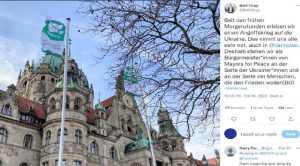Transcending national borders—Prior to General Conference of Mayors for Peace, Part 2: Barriers at national level to “alliance of cities”
Oct. 19, 2022
Will reliance on nuclear deterrence change?
by Kana Kobayashi and Fumiyasu Miyano, Staff Writers
The flag of the Mayors for Peace organization, garnished with an image of a white dove and the word “Peace,” flew over the majestic Hannover City Hall in Germany. Earlier in 2022, on February 24, Belit Onay, the mayor of the city of Hannover, posted a photograph of the flag on his Twitter feed with the message, “The city supports people who seek peace.” On that same day, Russia President Vladimir Putin announced its invasion of Ukraine.
According to the Hiroshima Peace Culture Foundation, an organization located in the city’s Naka Ward that serves as the secretariat for Mayors for Peace, about 30 member cities in Germany also raised the organization’s flag within one week in response to the initiative of Hannover, a vice president city of the organization. The initiative spread over social media, creating momentum that led to around 140 mainly European cities joining the Mayors for Peace organization.
Drawing line between national and city governments
Mayors for Peace is made up of 6,476 overseas member cities from 165 countries and regions (as of October 1, 2022). Among that total, 641 of the cities are located in eight nuclear weapons nations, excluding North Korea, and as many as 2,840 of the cities belong to 27 member nations of the North Atlantic Treaty Organization (NATO), even excepting the nuclear weapons states of the United States, France, and the United Kingdom. Those cities have maintained distance between the stances of their own national governments and continue to demonstrate their intention to work toward the elimination of nuclear weapons.
“Solidarity between the A-bombed cities of Hiroshima and Nagasaki and other cities around the world is important because any and all cities can be a target of nuclear attack,” stressed Emmily Talpe, mayor of the city of Ypres in Belgium, a NATO member nation. Ypres raised the flag of the Mayors for Peace between August 6 and 9 in 2022 to coincide with the anniversaries of the atomic bombings of Hiroshima and Nagasaki.
However, barriers at the national level stand as an obstacle to solidarity among member cities. Finland and Sweden applied for admission to NATO against the backdrop of a growing sense of danger regarding use of nuclear weapons in Ukraine and, with that, the trend marked by reliance on nuclear deterrence as a means of security seems to only be growing.
NPT Review Conference breaks down
At the Nuclear Non-Proliferation Treaty (NPT) Review Conference, held at the United Nations headquarters in New York City last year in August, Nagasaki City Mayor Tomihisa Taue, who serves as vice president of Mayors for Peace, called for a “world free of nuclear weapons.” However, the NPT Review Conference broke down due to opposition from Russia about wording relating to Ukraine, resulting in failure to adopt a final document summarizing measures related to nuclear disarmament, among other policies.
Following Russia’s invasion of Ukraine, the Mayors for Peace organization sent a statement to United Nations member states as well as Mayors for Peace member cities on March 16, outlining the organization’s wish for a quick conclusion to the war. That has been the only action taken by the organization, however. With numerous local governments in Japan canceling exchange activities with Russia, the Hiroshima City government has broken off its commemorative activities with Volgograd, stating that Hiroshima “is not confident it can conduct such activities safely, now that Russia had launched an invasion of Ukraine.”
The city government of Volgograd requested that it be allowed to participate online in the Mayors for Peace General Conference, scheduled to take place in Hiroshima City on October 19 and 20. The city government will only view the conference but has no plan to speak at the gathering.
Alba Barnusell, mayor of the city of Granollers in Spain, which is a NATO member nation, stressed that even in this climate of hostility, “Expanding solidarity among cities can lead to the ability to change the tide in the international community.” Can the “alliance of cities” represented by Mayors for Peace, whose strength lies in solidarity among cities that transcends borders, break through national barriers in a world in turmoil hindering such ties? Now is the time to demonstrate the organization’s determination through not only ideas but also action.
(Originally published on October 19, 2022)








